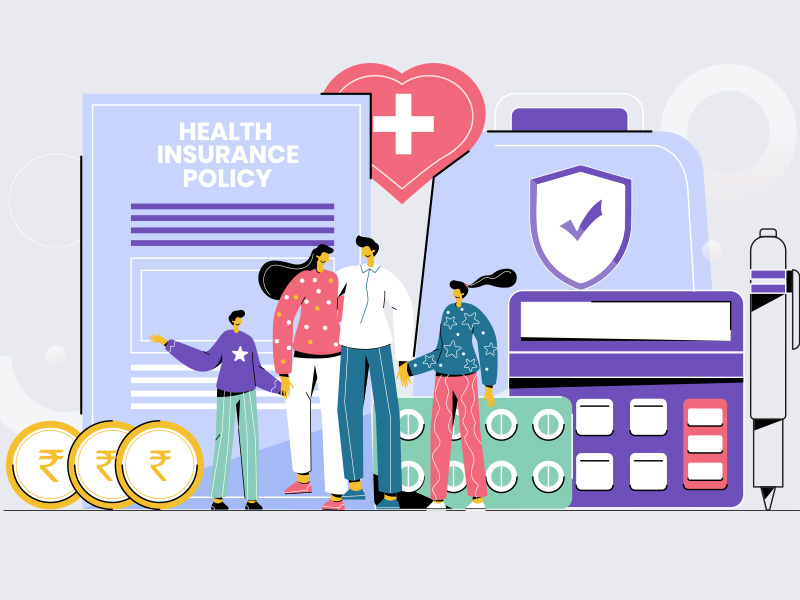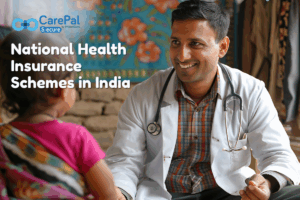Health Insurance 101: How to Determine the Right Amount of Coverage

One of the most crucial steps towards securing your family’s future is ensuring you have the right health insurance coverage. In this article, we will explore the various aspects of determining the appropriate health coverage level necessary to safeguard yourself and your family.
The Significance Of Health Insurance
Health insurance is not just a financial investment but a safeguard against unforeseen medical expenses. It acts as a safety net, offering coverage for various medical needs, including planned hospitalizations, unexpected medical crises, and non-hospital medical treatments.
However, what seems satisfactory today may fall short of providing adequate protection in the future. Therefore, it is vital to meticulously evaluate your health insurance needs, especially if you have dependents.
Factors Influencing Your Health Insurance Needs
Determining the right amount of health insurance coverage is not a one-size-fits-all decision. Several factors come into play, each of which can significantly impact your insurance needs. Let’s delve into these factors in detail:
1. Age: Age is pivotal in determining your health insurance requirements. As you age, your health risks increase and you may need higher coverage to address potential medical issues.
For instance, a 25-year-old might opt for a plan with a sum insured of Rs. 5 lakhs, while a 45-year-old might need coverage worth Rs. 10 lakhs or more. It’s important to note that purchasing health insurance at a younger age when premiums are lower can lock in a lower premium rate for the future, providing long-term financial benefits.
2. Family Size: Family size is important when deciding on health insurance. If you have a family, you must consider covering your spouse, kids, and maybe even your parents if they depend on you. For a family of four (two adults and two kids), getting health insurance with coverage of Rs. 10 lakhs or more is a good idea. This way, everyone in your family, from the youngest to the oldest, can get the medical care they need without worrying about money, keeping them safe and healthy.
3. Lifestyle: Your lifestyle choices and habits can impact your health insurance requirements. If you lead a sedentary lifestyle, you may be at a higher risk of lifestyle-related illnesses like diabetes or heart disease. In such cases, having a higher coverage amount is prudent. It’s essential to consider that the average cost of treating a heart ailment in India can range from Rs. 1.5 lakhs to Rs. 5 lakhs, depending on the severity. Thus, factoring in such uncertainties is crucial when deciding the sum insured in your health plan.
4. Existing Health Conditions: It’s important to think about your existing health issues when deciding on your insurance. Getting more coverage is a good idea if you already have medical conditions. This way, you ensure you have enough money to pay for your treatment without stressing your finances. This extra coverage can be a big help if you need medical care for your pre-existing conditions.
5. Type of Policy: Before you make your choice, it’s smart to learn about the different types of health insurance plans available. There are individual plans and family floater plans. Individual plans might cover less because they’re just for one person. On the other hand, family floater plans offer more coverage. That’s because any family member can use the total amount of money the insurance gives you.
So, if one person needs a lot of medical care, the others still have enough coverage left. Understanding these options helps you pick the best plan for your family’s needs.
6. Potential Medical Expenses: Consider the possibility of facing significant medical expenses related to critical illnesses like kidney failure, heart conditions, cancer, or strokes in the future. These conditions can entail substantial costs, and it’s prudent to factor in such uncertainties when determining the appropriate sum insured for your health plan. Additionally, you may enhance your coverage by opting for a critical illness plan to extend your base coverage.
7. Choose a Preferred Hospital: When selecting a health insurance plan, look for options that include your preferred hospital within their network. This allows you to benefit from cashless treatment. Moreover, research and estimate the approximate cost of hospitalization at your preferred facility or within your locality to gain insights into the necessary coverage.

8. Existing Insurance Coverage: If you are already covered by a group insurance policy provided by your employer, use this as a reference point to gauge the level of coverage required for your personal health insurance plan.
9. Family Medical History: When choosing a health insurance plan, consider your family’s health history. Some illnesses, like diabetes and hypertension, can run in families due to genetics. It would be best to consider how these hereditary diseases might affect you or your family in the future.
When picking a plan, ensure it offers benefits that can help if these conditions appear. This way, you will have the support you need to manage any hereditary health issues and ensure the well-being of your family.
10. Affordability: When deciding on health insurance, it’s crucial to consider how much you can afford to pay for the insurance premium. It’s not a good idea to choose a really high coverage amount if the premium, which is the money you pay regularly for the insurance, is too expensive. That could end up putting a big financial strain on you.
So, balancing what you can afford with how much coverage you need is important. By finding the right balance, you can ensure that you have adequate insurance without causing financial stress.
11. Explore Tax Benefits: If you are purchasing health insurance for tax benefits, calculate the desired amount of tax deductions you seek through the insurance plan. Then, choose a plan that aligns with your tax-saving objectives.
12. Coverage for High-Cost Medical Treatments: To determine the appropriate health insurance coverage, ensure that the sum insured is sufficient to provide financial protection for expensive medical procedures, such as artery bypass surgery, especially when performed at a hospital of your preference.
Minimum Health Insurance Coverage
While the above factors provide a comprehensive framework for determining your health insurance needs, it’s essential to establish some minimum coverage recommendations as a baseline. Remember that these are just guidelines, and your circumstances may require more coverage.
1. Basic Hospitalisation Expenses: Your health insurance should cover basic hospitalization expenses, including room charges, surgeon fees, and medication costs. For this, a minimum coverage of Rs. 5 lakh is advisable.
2. Critical Illness Coverage: Consider a separate critical illness policy from CarePal Secure in addition to your regular health insurance. This can provide coverage for major illnesses like cancer, stroke, or organ transplants, which can be financially devastating. A coverage of Rs. 10 lakhs or more is recommended for critical illness policies.
3. Maternity and Childbirth: If you’re considering having children, ensure your health insurance includes maternity and childbirth coverage. These expenses can be quite high, and a policy covering them is crucial for your financial well-being during this important life event.
4. Long-term Considerations: As you plan for your future, consider long-term health insurance needs. With rising medical costs, it’s wise to have a health insurance plan like CarePal Secure that can cover you well into your retirement years.
Deciding how much health insurance you need in India is a significant decision that impacts your financial security and your peace of mind. It’s about protecting your loved ones and ensuring you can access quality healthcare when needed. While guidelines and minimum coverage recommendations exist, the right amount depends on your unique circumstances.
Choosing a comprehensive health insurance plan isn’t just smart; it’s an investment in your well-being and your family’s future. Take time to assess your healthcare needs, compare policies, and pick one that fits your needs. These steps lay the groundwork for a healthier and more secure future for you and your loved ones.
Comprehensive health insurance coverage is paramount in today’s ever-changing and unpredictable world. The need for a robust safety net has never been more apparent. At CarePal Secure, we recognize this need, offering customer-centric and holistic healthcare financing solutions.
India’s healthcare system can feel like a maze, but well-designed insurance plans can be your guiding light, offering peace of mind in uncertain times. Prioritizing your peace of mind, these plans are designed to protect your health and ensure your financial stability.
It’s crucial to take the time to explore your options, engage in thoughtful deliberation, and make an informed choice. By selecting a health insurance plan that aligns with your aspirations, you can take a significant step towards securing a healthier and more secure future for your family.
Conclusion
Secure is designed to provide you and your family with comprehensive, accessible, and affordable healthcare solutions. Whether you’re an individual, a family, or a senior citizen, there’s a plan designed to provide financial security and peace of mind.
Some key reasons why you should choose CarePal Secure are:
Extensive Coverage: Get access to a wide network of hospitals for cashless treatments, covering everything from regular health check-ups to major hospitalisations.
No Waiting Period for Essential Coverage: CarePal Secure offers immediate access to essential healthcare benefits so that yCarePal ou can receive critical medical treatment without long approval delays.
24/7 Medical Assistance & Claims Support: Our dedicated helpdesk is available round-the-clock to assist you with medical emergencies, claim processing, and consultation bookings.
Teleconsultations & Healthcare Discounts: Our seamless teleconsultation services allow you to access specialists across 18+ medical fields. Additionally, you can enjoy significant savings on medicines, diagnostic tests, and outpatient care, making quality healthcare more affordable.
Affordable Plans with Super Top-Up Options: Choose from a range of budget-friendly plans for individuals, families, and seniors. Our super top-up policy for seniors provides additional financial protection, covering larger medical expenses at a lower cost.
Tax Benefits Under Section 80D: The premiums paid toward CarePal Secure health insurance are tax-deductible, helping you save money while ensuring comprehensive coverage for yourself and your family.
With trusted partners nationwide, CarePal Secure ensures that quality healthcare is always within reach. So what are you waiting for? Join 80,000+ satisfied customers who trust CarePal Secure for their healthcare needs.
Get in touch with us to know the right plan for you.












